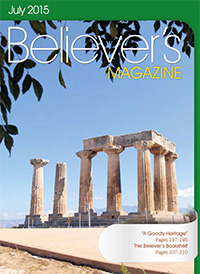A number of accredited brethren believe and teach that the Church is the Bride of the Lamb. Is this view correct?
In reply to this I can only ask the reader to read and consider three passages, namely John 3.29, Ephesians 5.25-27 and Revelation 19.7-8. These references teach that the Church is the Bride. It is true that the Church is not expressly described as the Bride, but the imagery of Ephesians 5.25-27 can surely only apply to a bride and not to a body. The body is mentioned in v.28. Because of her earthly relationship to Christ, Israel is the friend of the Bridegroom and not the Bride. Thus John the Baptist speaks of himself as only the friend of the Bridegroom. Surely if Israel were the Bride John would be part of her, but he was a prophet and a representative of the Old Testament saints. I think the words of the Baptist in John 3.29 show the distinctness of the Bride from the nation of Israel.
Some brethren whom we respect consider that Israel and not the Church is the Bride, but there are difficulties in this belief. We hold that the Bride of Christ is in view in Revelation 19.7. Notice that the scene presented there takes place in heaven. Israel, even restored Israel, will never as a nation be found in heaven - their blessings are earthly. The Judgment Seat of Christ will be in heaven where the Church has already been raptured, so how then can Israel be intended, who will still be on earth passing through her time of "trouble". Some even believe that the Bride will consist of faithful believers. This I cannot see in Scripture, because I believe all the Church will form the Bride.
It would be well worth while for believers to look into the truths concerning the figures used by the Holy Spirit of the Church. The Church is presented in three aspects: as a BUILDING that cannot be destroyed (Eph 2.21-22); as a BODY that cannot be divided (1 Cor 12.13); as a BRIDE that cannot be divorced (Rev 19.7). In these three figures of the Church we have the relationship of Christ to His redeemed people. The Building suggests a lasting relationship with Christ, the Body a living relationship with Christ, the Bride a loving relationship with Christ. These are wonderful truths to enjoy.
John J Stubbs
How many of the adult children of Israel who left Egypt passed into the Land?
We are told of the numbering of the people before the erection of the Tabernacle; this numbering was in connection with the atonement money, and the silver collected was to form the bases of the pillars in the Tabernacle: "every one that went to be numbered, from twenty years old and upward...six hundred thousand and three thousand and five hundred and fifty (603,550) men" (Ex 38.26).
A further numbering of the people took place some nine months later, after the erection of the Tabernacle, since we are told that "the Lord spake unto Moses...in the tabernacle of the congregation...Take ye the sum of all the congregation of the children of Israel...From twenty years old and upward" (Num 1.1-3). This second numbering was to determine the number of men "able to go forth to war" (Num 1.3). Remarkably, the total here is exactly the same, namely 603,550 (Num 1.46).
Subsequently, upon hearing the report of ten of the twelve spies commissioned to spy out the Land, with the children of Israel encamped in the wilderness of Paran, relatively near to the border of Canaan, the people were not governed by faith but by unbelief. Having been tempted beyond the limit of His forbearance, the Lord told Moses that this rebellious generation would perish in the wilderness: "Your carcases shall fall in this wilderness; and all that were numbered of you…from twenty years old and upward, which have murmured against me...shall not come into the land...save Caleb the son of Jephunneh, and Joshua the son of Nun" (Num 14.29-30).
A further census of the people took place in the fortieth year of their journey through the wilderness in preparation for the people to go over into the Land: "These were the numbered of the children of Israel, six hundred thousand and a thousand seven hundred and thirty (601,730) (Num 26.51). "For the Lord had said of them, They shall surely die in the wilderness. And there was not left a man of them, save Caleb the son of Jephunneh, and Joshua the son of Nun" (Num 26.65).
The writer to the Hebrews makes reference to those "whose carcases fell in the wilderness" (Heb 3.17) and says, "they could not enter in because of unbelief" (Heb 3.19). Thus, because of this refusal to hear, they forfeited the Land. How terrible is unbelief. How solemn and sobering is this warning!
David E West









